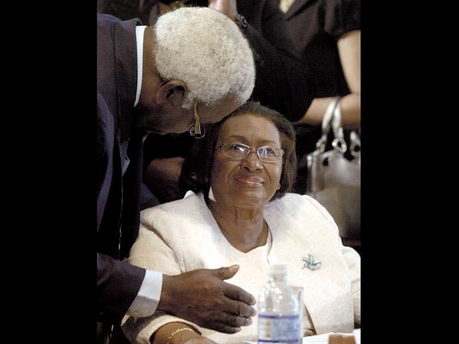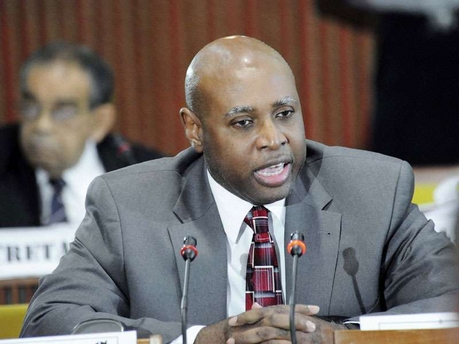Columns By Category
Popular Articles
- THE REALITY OF TACKY AND SAM SHARPE
- PLEASE DON’T BETRAY US AGAIN POLITICIANS
- CRY, MY MURDEROUS COUNTRY
- MODERNIZING THE PNP: VERSION.2020
- IS THE EXCHANGE RATE ON TARGET OR IS IT A WHOPPER?
- CARICOM: BEACON OF DEMOCRACY OR COWARDLY DISGRACE?
- DEMOCRACY PREVAILS IN THE UNITED STATES
- THE CRIME STATISTICS SPEAK FOR THEMSELVES
- PETROJAM, OIL PRICES, AND THE $7 TAX
- Kevin O'Brien Chang | Brains, not brutality – smart(phone) crime fighting
- TERRORISM IN JAMAICA
- STOP CURRENCY CRISIS TALK
- 'CASTIGATED KD' AND THE 9 YEAR WONDER
- GET PAST MERE TALK ON DONS AND GARRISONS
- LOW VOTER TURNOUT MYTHS AND ELECTION PREDICTIONS
- HOW GREAT CAN BROGAD BE?
- PNP WAS SOCIALIST FROM THE START
- AN AGE AND GENDER RE-ALIGNMENT ELECTION?
- Most influential Jamaican of 2010-2019?
- NO GAYLE, NO RUSSELL, NO TALLAWAHS
CSI Manatt in Wonderland
- 3-20-2011
- Categorized in: 2011 Articles, Politics
http://jamaica-gleaner.com/gleaner/20110320/focus/focus7.html
Published: Sunday | March 20, 2011
"When the facts change, I change my mind. What do you do, sir?" - John Maynard Keynes
"Curiouser and curiouser!" cried Alice. - Lewis Carroll
Kevin O'Brien Chang, Contributor
A phantom email. A mystery letter. Obeah envelopes. St Patrick's Day at the Manatt enquiry was straight out of Alice in Wonderland.
Perhaps the strangest turn was the reaction to the reply from Manatt to a letter sent by Attorney General Dorothy Lightbourne. Now, considering this entire thing is basically an enquiry into Manatt's role in the Christopher 'Dudus' Coke extradition, you would think all parties would be interested in anything the firm had to say. But the objection to the reading of this reply by Oliver Smith, Solicitor General Douglas Leys' lawyer, was supported by K.D. Knight.
Only a few weeks earlier, Mr Knight had remorselessly cross-examined Mr Leys, doing everything he could to compromise Mr Leys' credibility. But here he was strenuously arguing against the admission of evidence which might be prejudicial to Mr Leys, even though, according to Mr Knight, it might support his client's position! Previously, at daggers-drawn loggerheads, Messrs Knight and Smith were now almost comrades in arms. The whole thing was simply surreal. But then, Jamaica is nothing if not a twilight zone.
Rational self-interest
One of the problems with trying to make sense of this island is that while in normal countries rational self-interest is a given, it is never a safe assumption in Jamaica. Take the email bombshell dropped by Mr Smith, which purported to show Attorney General Dorothy Lightbourne in contact with Harold Brady about the Coke extradition matter, something she had previously denied. If this email is proven authentic, Ms Lightbourne's credibility is completely destroyed.
But authentic or not, it has already made it impossible to believe any of Mr Leys' testimony, except that backed by written documents or the accepted opinion of other disinterested parties. It was a scarcely credible act of self-destruction, reminiscent of the West Indies collapse against England.
Before this email was produced, Mr Leys and Ms Lightbourne, despite minor differences of recall, were pretty much in sync on the major points. Based on the evidence provided, there seemed to have been strong legal reasons not to extradite Coke. Mr Leys' written opinion, to this effect, was backed by Deputy Solicitor General Lackston Robinson. According to Mr Leys - and none of the cross-examiners questioned him on this fact - this was also the opinion of other eminent lawyers, such as Patrick Robinson, a respected Commonwealth lawyer whose name escapes me now, Frank Phipps, Hugh Small and Lloyd Barnett.
There was also nothing to suggest that the Government engaged Manatt, Phelps & Phillips, or that the firm acted on behalf of the Government in an official capacity. There had been no evidence to contradict Mr Leys' assertion that in his mind, Harold Brady was uninvolved in the Coke extradition, and thus, he had no reason to suspect anything might be amiss in Mr Brady introducing him to lawyers from Manatt who might be of assistance to him in the matter.
That is until Mr Leys' own lawyer, presumably on his instructions, introduced the bombshell email from the attorney general's office addressed to him, and copied to Mr Brady. Because this email is proof that Mr Leys knew from September 16, 2009 that Mr Brady was well acquainted with the facts of the extradition. Indeed, it was surely Mr Leys' duty, after receiving this email, to enquire of the attorney general just why she was sharing such information with someone who was, on the face of it, completely uninvolved with the matter. It would have been extremely strange for him not to do so.
'Cui bono'
And certainly it makes a mockery of Mr Leys' claim that he assumed Mr Brady's urging him to meet with Manatt on the issue to be nothing but innocent, friendly advice. A child would have asked Mr Brady something along the lines of 'Why did the AG copy you on details of the Coke extradition, and why are you so interested in the matter and so anxious for me to use these Manatt guys?' Ambassador Evadne Coye's admittedly inconsistent testimony about her conversations with Mr Leys about Manatt suddenly do not seem as irrelevant as it once did.
The answer to most human behaviour is normally 'cui bono' - to whose benefit? But it is very difficult to see how the introduction of this email into evidence by his lawyer could be of any benefit to Mr Leys. Unless, of course, he felt utterly compelled to tell the truth, the whole truth and nothing but the truth, even at a cost to himself. But then, why would he have previously testified that he had no reason to think Mr Brady had any connection whatsoever with the Coke extradition when introducing him to Manatt?
As for Dorothy Lightbourne, she started off well, and has maintained her composure. But her testimony has increasingly been riddled with inconsistencies and illogic. Nonetheless, she has resolutely stuck to her guns, even on matters of no major importance where there is no hard evidence to back her up, such as her repeated assertion that 'I spoke to Colonel Cole'.
Is she a blatant liar and world-class actress? Is she simply lacking in capacity and in over her head? Is she somehow telling the weird truth about a very complicated and convoluted matter? Next week's promised CSI-style computer forensics and the testimony of Verna McGaw, who sent the email - and, in another bizarre 'Looking-Glass' twist, is now employed by this present commission! - should settle the matter one way or another.

Mixed-up roles
One thing is for certain, never again should one person hold both posts of justice minister and attorney general. During her testimony, it was virtually impossible to tell when Ms Lightbourne was acting as one or the other, since she was, in effect, giving advice to herself. This mixing of roles has contributed mightily to the fog of confusion surrounding the whole affair, and such a ridiculous situation must never be repeated.
None of this bodes well for the testimony of Prime Minister Bruce Golding (this was written before he took the stand). The public is now even more sceptical than it was before the commission began. I, for one, will only be prepared to believe that which Mr Golding has documentation to support. I was previously prepared to accept whatever the witnesses said that made sense and was not contradictory. Mr Leys' clear untruth under oath has proven me wrong. But as Keynes said, when the facts change, so should our minds.
Like all Jamaicans, I hope the prime minister answers all facts to everyone's satisfaction so we can put this thing behind us for good. But I'm not sure even the most brilliant performance can rescue Mr Golding's reputation. The fact is, you can't reason people out of what they did not reason themselves into, and the level of distrust many feel towards the prime minister is not fully logical. Indeed, my vox pops suggest that very few regular folk have any real understanding of the whole Manatt affair. They simply feel that based on his stunned 'Me never hear that name before!' reaction to Dr Peter Phillips' questions about Manatt, Mr Golding misled Parliament and lied to the public.
His subsequent explanations may well be logically true, but they are unlikely to ever overcome that initial emotional feeling of betrayal. Had Mr Golding actually done things to try and win back the public trust - such as release his financials as promised - he might have won some forgiveness. But all the man has done is talk and talk.
And as the song says:
Don't want to be going by something I heard,
'Cause baby, actions speak louder than words.


